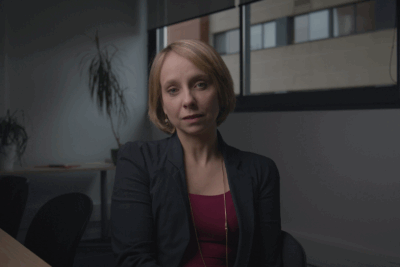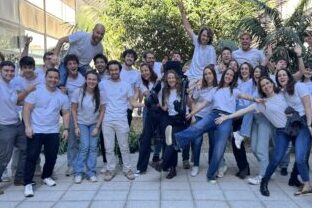30th November 2023
Greek hospitals and healthcare start-ups are eager to join forces, and the benefits of such partnerships are undeniable – from improved patient care to putting Greece on the map as a hub for healthcare innovation. However, a significant roadblock stands in their way: without adequate funding, many promising projects are left unrealised. In a recent Morning Health Talks event titled “Funding Inbound Open Innovation in Hospitals & Healthcare Systems,” experts from all sides shared their insights on this issue and presented new funding channels which can unlock the potential of Greek healthcare. The discussion was organised by the National Documentation Centre (EKT), the EIT Health Hub in Greece.
Since 2022, the National Documentation Center, EKT has focused on encouraging collaboration between start-ups and hospitals through its SymbIASIS capacity-building programme. The initiative has 17 hospitals and clinics onboard, recruited 50 start-ups for 2023, and has already yielded promising outcomes. However, EIT Health Hub Coordinator in Greece and Horizon Europe NCP Coordinator, George Megas, pointed out a significant challenge – the lack of funding for these collaborations. While start-ups can establish connections with hospitals and clinics, the funding required for pilot programmes has often been unavailable with a few exceptions.
The challenge for hospitals and start-ups
Showcasing the perspective of the hospitals, Maria Driva, Director of Leto Maternity Clinic, offered insights into the needs of the Athens clinics with a 52-year history of excellence in healthcare. “Hospitals are willing to invest in pilots and implementing start-up solutions within their clinics if it means improving efficiency and saving costs”, she said. Maria Driva also highlighted the practical challenges hospitals face, such as the tedious manual reporting of medical waste in spreadsheets, emphasising the need for innovative digital solutions. She added, “We are even further behind in using Big Data and AI in healthcare, but we are open to solutions from start-ups.”
From the other side of the equation, the leader of a promising Greek healthcare enterprise emphasised the need for funding for start-ups doing pilots in real-world environments. Alexis Fourlis shared the story of EMMA, a start-up developed to address the issue of overcrowded emergency rooms. The solution involved machine learning and real-world data analysis to design a Clinical Decision Support System. The journey of EMMA from concept to reality was a testament to the potential of collaboration between healthcare providers and start-ups, as the solution is now in the testing phase in two emergency departments and one clinic within the University Hospitals in Thessaloniki.
Funding is not the only issue that sometimes prevents the connection of two sides. “Healthcare providers often find themselves overwhelmed by their daily responsibilities, making it crucial for innovators to bridge the gap and engage with healthcare providers to understand their requirements truly”, said Ion-Gheorghe Petrovai from Freshblood, the EIT Health Hub in Romania. To overcome this, innovators should understand the healthcare providers’ challenges and seamlessly fit into the patient journey rather than adding complexity. “Success also hinges on other factors, such as developing a solid value proposition, identifying metrics for value captured, and developing scalable solutions“, added Georgios Kourepis from Deloitte, stressing that the most important factor was finding the appropriate funding mechanisms.
Funding opportunities for open innovation
A fundamental solution to this funding gap lies in market-based financing. George Georgiadis, an Angel Investor & Innovation Strategy Advisor, provided a unique perspective from an investor’s viewpoint. Georgiadis underlined that the presence of healthcare providers in collaboration with start-ups significantly reduces investors’ perceived risk. “The involvement of hospitals signals a potential market for the product or solution, making it a more attractive investment opportunity”, he said. To emphasise the importance of early-stage partnerships, Georgiadis shared the story of a start-up that designed a gamified VR headset for stroke rehabilitation. Already collaborating with 20 clinics, its early traction and revenue generation significantly heightened its appeal to investors.
However market funding might not be enough for everyone. Horizon Europe, the EU’s flagship funding programme for Research and Innovation, offers a wealth of new funding opportunities in its dedicated Health cluster, amounting to €8.5 billion. These were unveiled by Sofia Xesfingi, the National Contact Point for Health and Cancer Mission of Horizon Europe at EKT. Xesfingi emphasised the potential for funding open innovation in hospitals through tools like Pre-Commercial Procurement (PCP) and Public Procurement of Innovation (PPI). Importantly, Cascade Funding, designed to facilitate the distribution of public funding to support entities like start-ups in digital innovation, can serve as a valuable resource for these partnerships.
In addition to these opportunities, there is a chance for public authorities and hospitals to procure innovative solutions through the Procure4health project, an open community working toward overcoming barriers to EU-wide adoption of innovation procurement. Carlos Laranneta, the coordinator of Procure4health, from the Regional Ministry of Health, explained that its 33 founding partners actively promote innovation procurement through knowledge sharing, capacity building, networking, matchmaking, and joint actions to address common needs.
Testing AI for healthcare in real environments
Another major source of services for these partnerships is the new TEF project (funded by Digital Europe Programme), which offers a network of testing facilities and infrastructure for innovators to conduct tests and experiments on their AI and robotics solutions in real or realistic environments. The healthcare segment of the initiative, the TEF Health AI Project, offers $60 million in funding. “The project will provide access to 50+ leading hospitals, medical universities, and certification bodies for testing AI solutions”, revealed Ricardo Vieira-Pires, TEF Health partner and Health Community Lead at EIT Health InnoStars. The project will offer access to investments for over 1500 start-ups through €30 million in services and more.
And this is still not the end of the list of funding sources. Spyros Arsenis, Director of the Innovation programmes of the National Bank of Greece, mentioned the opportunities for start-ups through competitions and acceleration programmes, like the bank’s NBG Seeds initiative. These offer essential support for start-ups on their maturation and market entry journey. He also recommended EIT Health programmes to start-ups. Speaking about these, EIT Health RIS Relationships Lead Ewa Kostecka presented two of the most relevant ones: Startups Meet Pharma and Startups Meet Hospitals. Also noteworthy is the EIT Health RIS Innovation Call, which supports mini consortia for piloting innovative solutions until the Proof of concept phase.
Still, more support for funding is available through the European Digital Innovation Hubs Network. Maria Pournari, COO of the network’s Health Hub highlighted the need for a common place of discussions between relevant actors of healthcare innovation and described their initiative, the Joist Innovation Park in Larisa, Greece, which is fulfilling this exact role. Furthermore, Maria highlighted the new marketplace offered by Joist and EIT Health Hub, which will facilitate the sale of innovative solutions developed by start-ups.
EIT Health and the EDIT-B consortium transform bipolar disorder diagnosis with groundbreaking blood test

Discover this life-changing project today.
Three EIT Health innovators nominated for EIT Awards

Meet our three EIT Award nominees.
Hospital Clínic study reinforces patient participation as key to digital health innovation

New work published in Journal of Medical Internet Research.